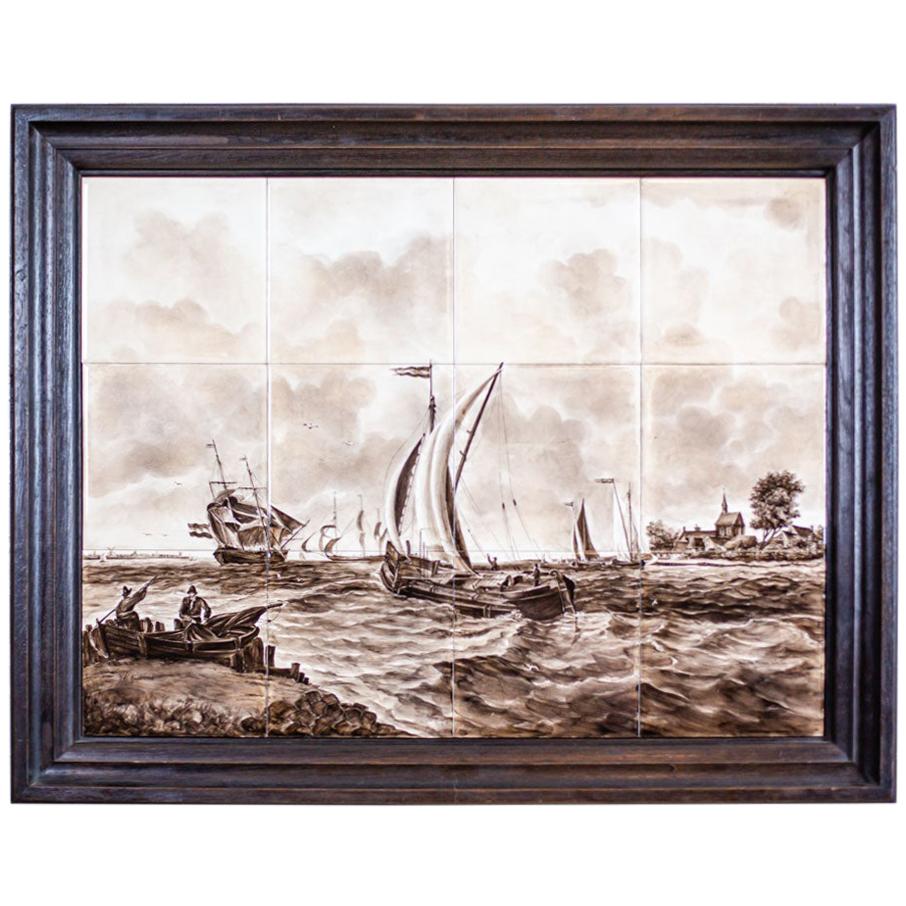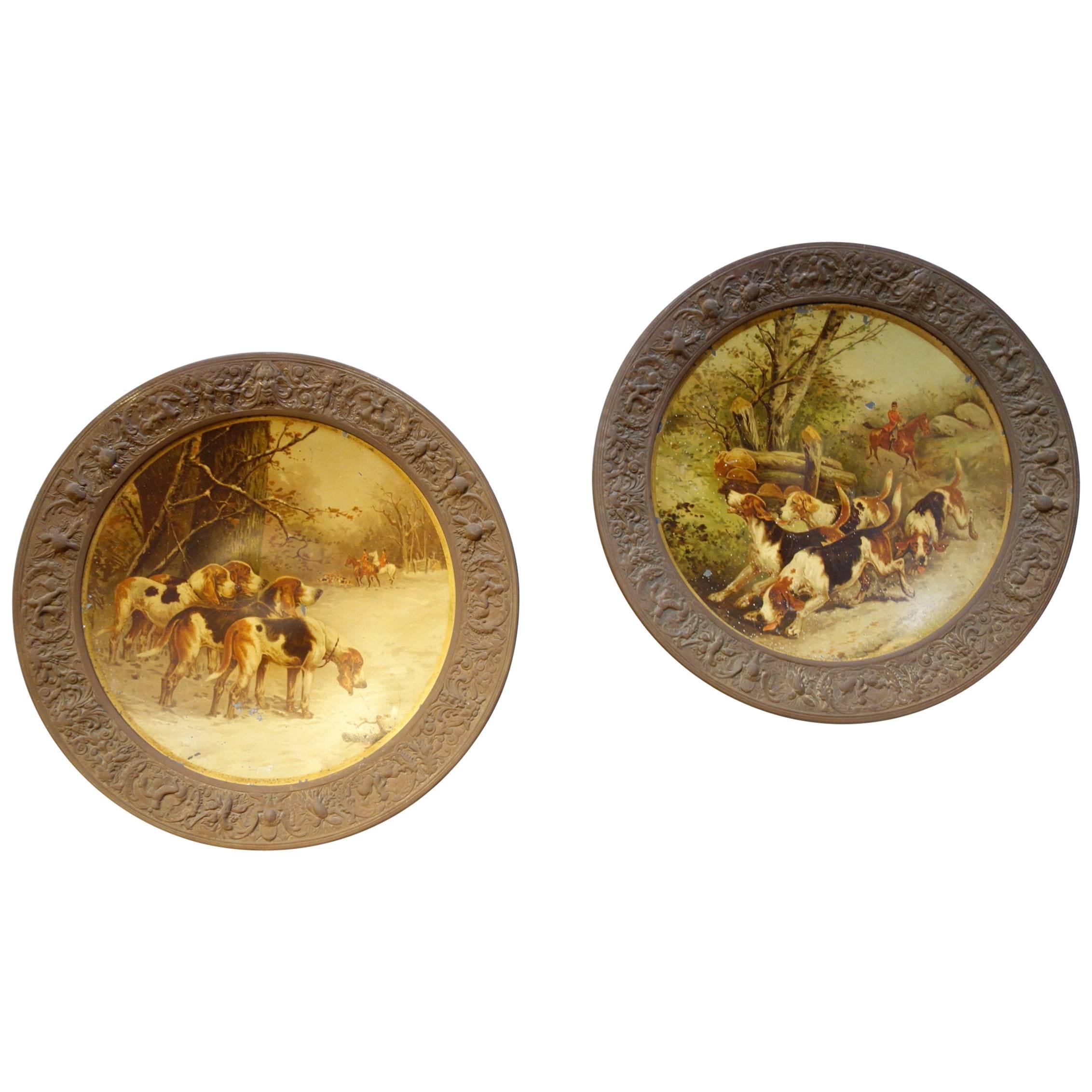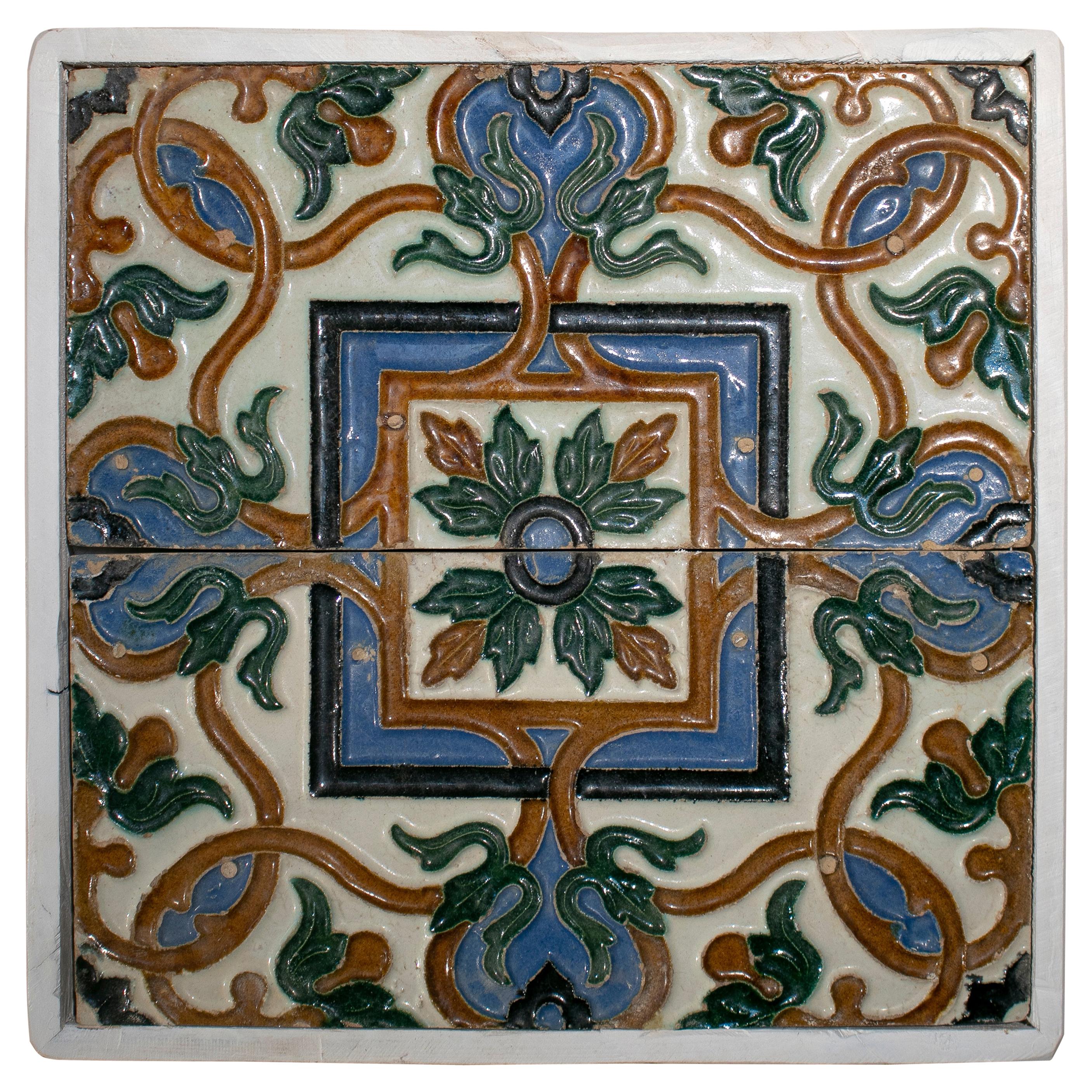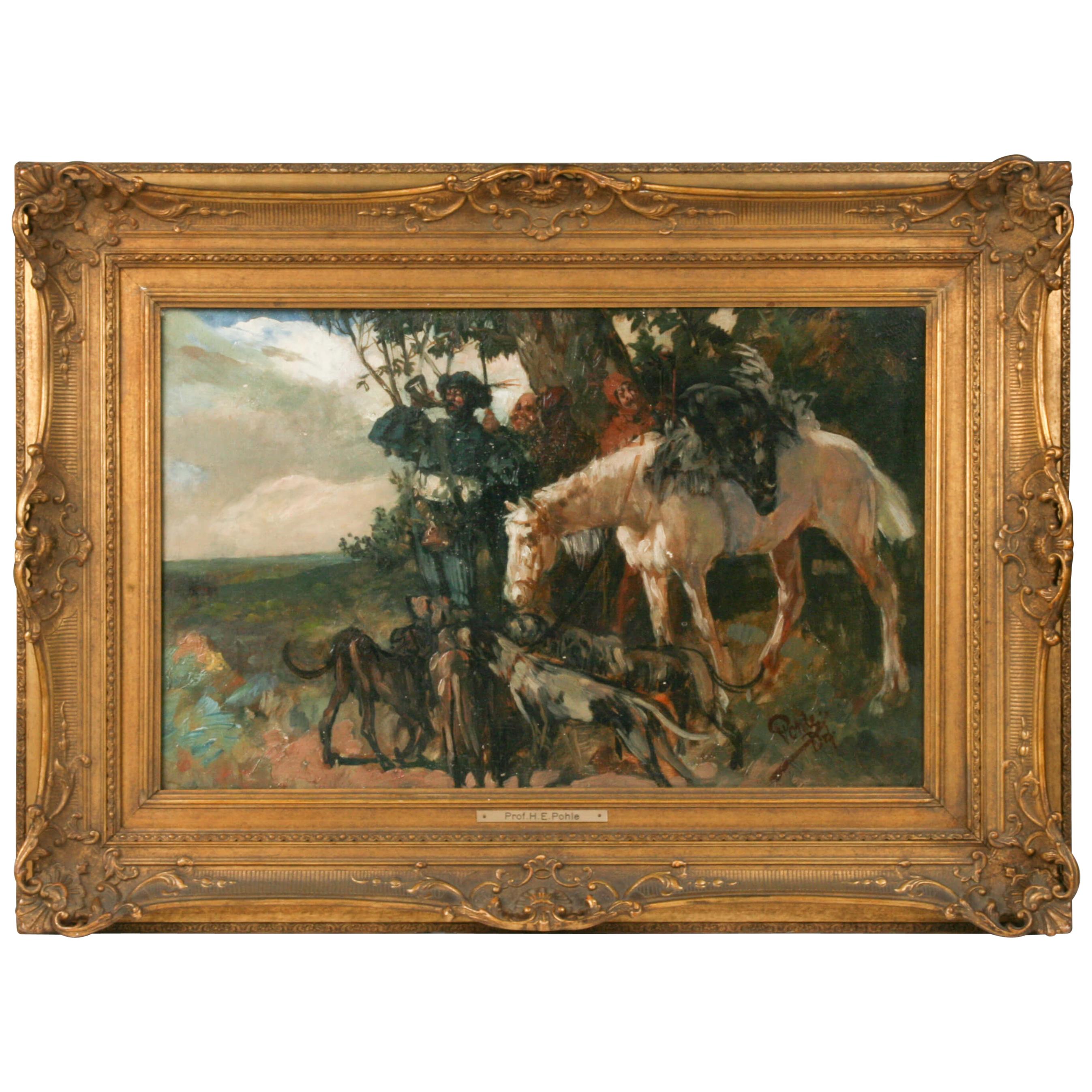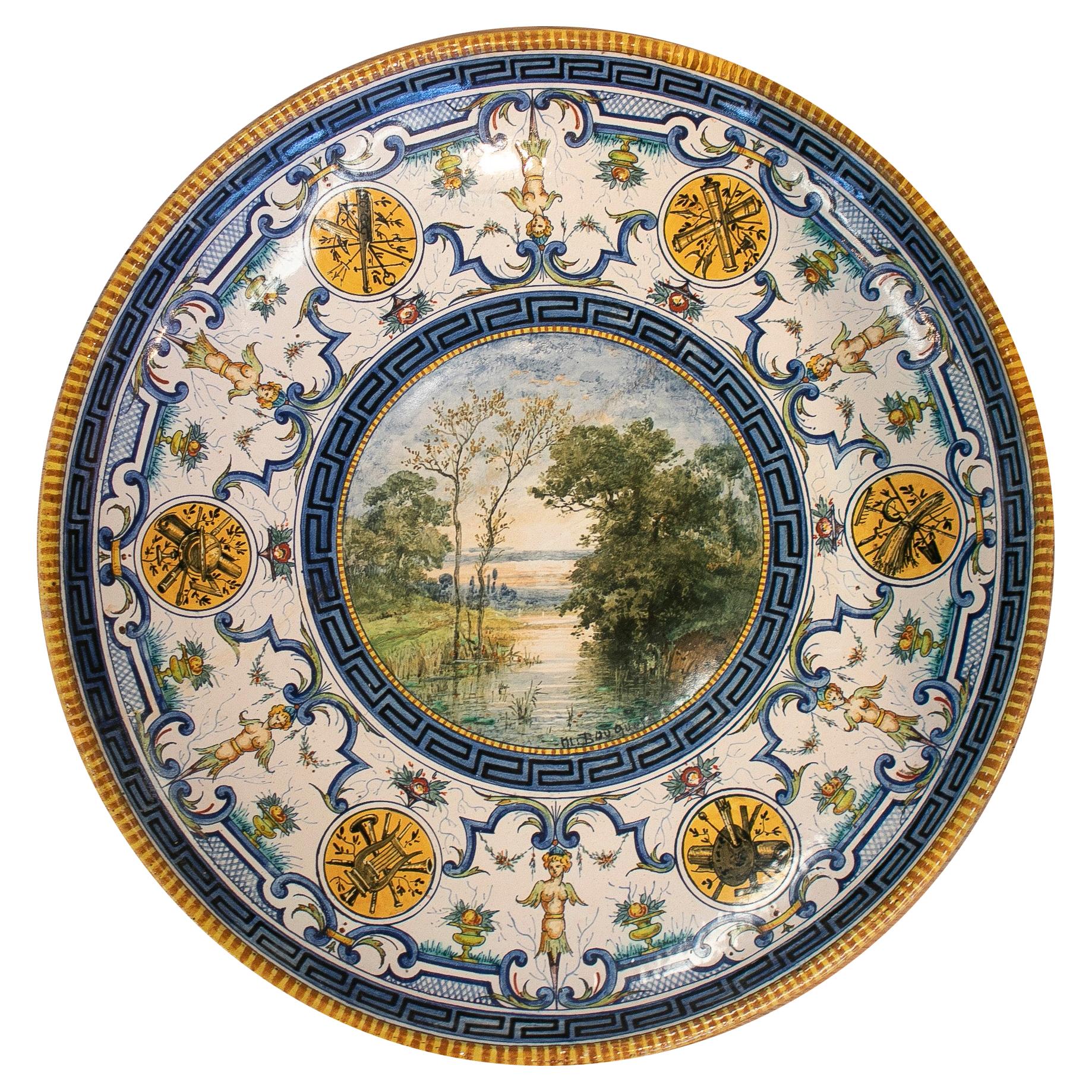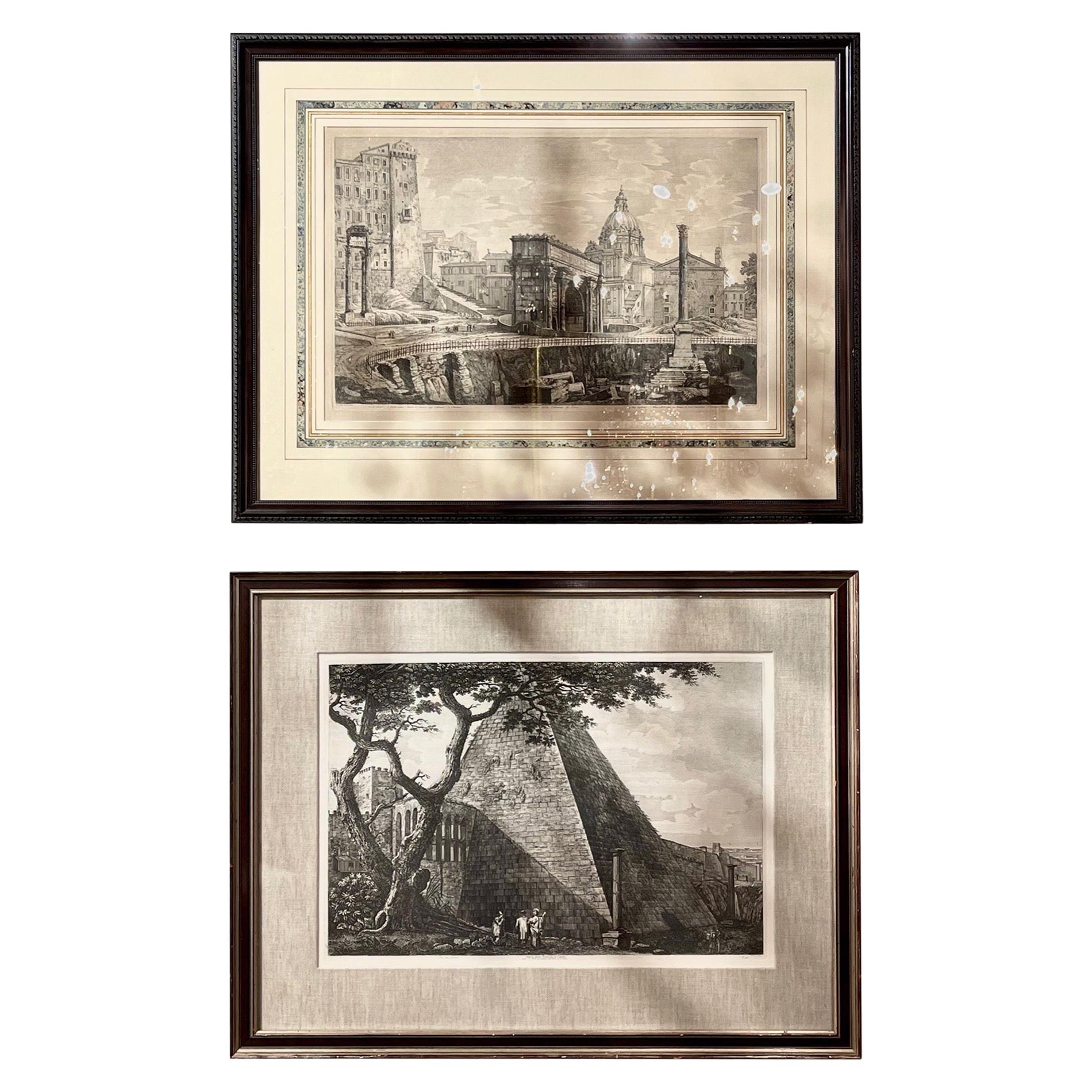Items Similar to Pair of French Blue and White Ceramic Hunting Scene Tiles, 19th Century
Want more images or videos?
Request additional images or videos from the seller
1 of 16
Pair of French Blue and White Ceramic Hunting Scene Tiles, 19th Century
About the Item
Reminiscent of 17th-century Portuguese azulejo tiles, which were inspired by Delft products of the Netherlands, this pair of French ceramic tiles has a cobalt blue and white color scheme. The roughly square tiles, which are from the 1800s, depict two distinct hunting scenes.
One tile (as seen on the left in the main photo) illustrates a hunter with a spear lunging at a large boar. Jagged terrain dotted with flora can be seen under their feet, with a large hill behind the boar topped with a tall flower. Clusters of roundels and tapered fluting fill open spaces, allowing the artist to utilize almost every inch of the tile. The subject of the second tile (on the right in the main photo) is another hunter, clad in a plumed bycoket hat (in French, it’s called a chapeau à bec, or “beak hat” because of its shape that resembles a bird’s beak) and poulines, which are shoes with exaggerated toes. He is wearing an ensemble very similar to the hunter on the first tile, which was common attire for the Middle Ages. This second hunter has three lively dogs on leashes, as they walk across more level ground with sparse vegetation. A large hill behind the hunting party partially obscures a castle, while fluting and groupings of roundels were also employed to aesthetically enhance the scene.
Our pair of 19th-century French hunting scene tiles can be hung as beautiful wall accessories in almost any room of the house from a bathroom to a hallway or game room. They could also be utilized in the kitchen as a unique pair of decorative back splashes behind a range or sink.
- Dimensions:Height: 13 in (33.02 cm)Width: 12.875 in (32.71 cm)Depth: 0.75 in (1.91 cm)
- Sold As:Set of 2
- Materials and Techniques:
- Place of Origin:
- Period:
- Date of Manufacture:1800s
- Condition:Repaired: Very small professional restoration to one tile. Wear consistent with age and use. Minor fading. Good antique condition, with visible craquelure, commensurate to age. Fleabites and minor nicks. Professional restoration to a very small section of the tile with the boar. Wire enclosure installed on the back for hanging purposes.
- Seller Location:Dallas, TX
- Reference Number:
About the Seller
5.0
Platinum Seller
These expertly vetted sellers are 1stDibs' most experienced sellers and are rated highest by our customers.
Established in 1983
1stDibs seller since 2011
742 sales on 1stDibs
Typical response time: <1 hour
- ShippingRetrieving quote...Ships From: Dallas, TX
- Return PolicyA return for this item may be initiated within 2 days of delivery.
More From This SellerView All
- Set of Large 19th Century French Brass Repousse Chargers of Mars and MinervaLocated in Dallas, TXPossibly inspired by a 1771 painting by Jacques-Louis David, this set of large brass chargers depict the Roman deities, Mars and Minerva. The painting by David (Minerva Fighting Mars...Category
Antique 19th Century French Neoclassical Decorative Art
MaterialsMetal, Brass
- 19th Century French Copper Bas Relief Plaque of a Young NoblemanLocated in Dallas, TXUsing the ancient metalworking technique known as repousse, this copper bas relief plaque of a young nobleman was hand-chiseled by a French artist in...Category
Antique 19th Century French Decorative Art
MaterialsCopper
- Pair of Large 19th Century Polychrome Faience Wall Plaques from HollandLocated in Dallas, TXIn the style of 17th and 18th century Delftware, this pair of large polychrome faience wall plaques are from Holland, a region of the Netherlands. Hand-painted faience from Holland, such as this pair from the 1800’s, were typically painted in the traditional cobalt blue and white, however our plaques have vibrant colors that enhance two distinct scenes. Both plaques feature a roughly ovate shape molding and sinuous cutouts, typically seen in Dutch faience after the 17th century. These contoured edges have been painted with a nondescript motif consisting of quick brush strokes using blue paint. The plaque on the left in our main photo depicts Jesus washing the feet of his disciples. Most of the followers are clad in blue, green, or gold robes...Category
Antique 19th Century Dutch Decorative Art
MaterialsFaience
- Antique French Louis XVI Style Gilt Bronze Wall Clock, 19th CenturyLocated in Dallas, TXCrafted in France in the 1800s, this high quality gilt bronze wall clock has elements in the style of Louis XVI. The white clock face with blue numbers re...Category
Antique 19th Century French Louis XVI Wall Clocks
MaterialsMetal, Bronze
- Pair of Large Wooden Blue and White Louis XVI Style Trophy PanelsLocated in Dallas, TXCarvings with a military, musical, hunting, or agricultural theme, known as trophies, became popular during the period of Louis XVI. This pair of large trophy panels have Neoclassica...Category
21st Century and Contemporary Italian Louis XVI Architectural Elements
MaterialsWood, Paint
- Antique Cast Iron Relief Charger from Germany, 19th CenturyLocated in Dallas, TXThis cast iron charger from Germany was hand-worked in the 1800s. The low-relief image, in this case, a Bacchanalian scene, is full of hundreds of small decorative and figurative details. The main body of the charger is recessed below the outer rim, which is adorned with a ring of foliage motif encircling fleur de lys and scrolls. A raised ridge separates the two repeating motifs, with eight mascaron and scrolled medallions interrupting the interior circle. In the center of the charger is a Neoclassical medallion surrounded by Vitruvian scrolls filled with beading. Based on the lively scene of revelry that surrounds the medallion, it is quite possible that the figure depicted in the medallion is Ariadne, the wife of Dionysus (or as the Romans called him “Bacchus”), the Greek god of wine and merriment. It is most likely an interpretation of when Dionysus found her abandoned on the island of Naxos. Numerous figures dancing and partaking in food and drink can be seen along the outside of the medallion, including mythological beings such as putti, satyrs, and nymphs, set amongst flora dotted with overturned drinking vessels. A small bracket is affixed to the verso side, allowing the cast iron German charger...Category
Antique 19th Century German Decorative Art
MaterialsMetal, Iron
You May Also Like
- 19th Century Illustration on Ceramic TilesLocated in Opole, PLWe present you a prewar marine illustration on ceramic tiles. All is hand painted, signed, and closed in an oak frame.Category
Early 20th Century European Decorative Art
MaterialsCeramic, Oak
- Pair of Early 19th Century Art Antique Hunting Scenes on Concave Tin Plates 1850Located in Encinitas, CADelightful pair of concave enameled tin plates with hunting scenes in frames of hand-wrought iron embossed with masks, mythological figures and fruit...Category
Antique Mid-19th Century Italian Romantic Decorative Art
MaterialsWrought Iron, Tin
- 19th Century Spanish Pair of "Cuerda Seca" Colored Glazed Ceramic Tiles FramedLocated in Marbella, ES19th century Spanish pair of "cuerda seca" dry rope technique colored glazed ceramic tiles in a frame.Category
Late 20th Century Spanish Ceramics
MaterialsCeramic, Wood
- End 19th Century Oil Painting Hunting Scene Herman Emil PohleLocated in Casteren, Noord-BrabantOil on canvas. Signed lower right, Hermann Emil Pohle. The painting is a genre piece. A Renaissance style hunting scene. The hunting horn is blown before...Category
Antique Late 19th Century German Renaissance Paintings
MaterialsCanvas
- Late 19th Century French Ceramic Plate w/ Claude Charles Rudhart Landscape SceneLocated in Marbella, ESAntique late 19th century French ceramic plate with Claude Charles Rudhart landscape scene.Category
Late 20th Century French Ceramics
MaterialsCeramic
- Pair of 19th Century Italian Roman Scene Copper EngravingsLocated in Dallas, TXBeautiful companion pair of 19th century copper engravings with Italian Roman scenes. Interesting scenes with amazing details make these very fine accessories!Category
Antique Late 19th Century Italian Drawings
MaterialsPaper
Recently Viewed
View AllMore Ways To Browse
French Hunting Scene
Antique Wall Accessories
Antique Kitchen Wall Art
Cobalt Blue Bird
Antique Hand Painted Ceramic Tiles
Antique Kitchen Tile
Antique White Kitchen Walls
Antique Blue White Tiles
Blue White Tiles Antique
Antique Blue And White Tiles
French Blue Tiles
Ceramic Birds Pairs
Pairs Of Ceramic Birds
Pair Of White Dogs
17th Century Tile
Boar Hunting
Used Bathroom Tiles
Antique Ceramic Dogs
